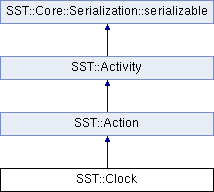#include <clock.h>

Public Types | |
| using | HandlerBase = SSTHandlerBase< bool, Cycle_t, true > |
| Base handler for clock functions. | |
| template<typename classT , typename dataT = void> | |
| using | Handler = SSTHandler< bool, Cycle_t, true, classT, dataT > |
| Used to create handlers for clock. More... | |
Public Member Functions | |
| Clock (TimeConverter *period, int priority=CLOCKPRIORITY) | |
| Create a new clock with a specified period. | |
| void | schedule () |
| Activates this clock object, by inserting into the simulation's timeVortex for future execution. | |
| Cycle_t | getNextCycle () |
| Return the time of the next clock tick. | |
| bool | registerHandler (Clock::HandlerBase *handler) |
| Add a handler to be called on this clock's tick. | |
| bool | unregisterHandler (Clock::HandlerBase *handler, bool &empty) |
| Remove a handler from the list of handlers to be called on the clock tick. | |
| std::string | toString () const override |
| Get a string represenation of the event. More... | |
 Public Member Functions inherited from SST::Activity Public Member Functions inherited from SST::Activity | |
| void | setDeliveryTime (SimTime_t time) |
| Set the time for which this Activity should be delivered. | |
| SimTime_t | getDeliveryTime () const |
| Return the time at which this Activity will be delivered. | |
| int | getPriority () const |
| Return the Priority of this Activity. | |
| std::string | getDeliveryTimeInfo () const |
| virtual void | print (const std::string &header, Output &out) const |
| Generic print-print function for this Activity. More... | |
| void | setQueueOrder (uint64_t order) |
| Set a new Queue order. | |
| uint64_t | getQueueOrder () |
| int32_t | getEnforceLinkOrder () |
 Public Member Functions inherited from SST::Core::Serialization::serializable Public Member Functions inherited from SST::Core::Serialization::serializable | |
| virtual const char * | cls_name () const =0 |
| virtual uint32_t | cls_id () const =0 |
| virtual std::string | serialization_name () const =0 |
Additional Inherited Members | |
 Static Public Attributes inherited from SST::Core::Serialization::serializable Static Public Attributes inherited from SST::Core::Serialization::serializable | |
| static constexpr uint32_t | NullClsId = std::numeric_limits<uint32_t>::max() |
 Protected Types inherited from SST::Core::Serialization::serializable Protected Types inherited from SST::Core::Serialization::serializable | |
| enum | cxn_flag_t { ConstructorFlag } |
 Protected Member Functions inherited from SST::Action Protected Member Functions inherited from SST::Action | |
| void | endSimulation () |
| Called to signal to the Simulation object to end the simulation. | |
| void | endSimulation (SimTime_t end) |
 Protected Member Functions inherited from SST::Activity Protected Member Functions inherited from SST::Activity | |
| void | setPriority (int priority) |
| Set the priority of the Activity. | |
| void | serialize_order (SST::Core::Serialization::serializer &ser) override |
 Static Protected Member Functions inherited from SST::Core::Serialization::serializable Static Protected Member Functions inherited from SST::Core::Serialization::serializable | |
| static void | serializable_abort (uint32_t line, const char *file, const char *func, const char *obj) |
 Protected Attributes inherited from SST::Activity Protected Attributes inherited from SST::Activity | |
| int32_t | enforce_link_order |
Detailed Description
A Clock class.
Calls callback functions (handlers) on a specified period
Member Typedef Documentation
| using SST::Clock::Handler = SSTHandler<bool, Cycle_t, true, classT, dataT> |
Used to create handlers for clock.
The callback function is expected to be in the form of:
bool func(Cycle_t cycle)
In which case, the class is created with:
new Clock::Handler<classname>(this, &classname::function_name)
Or, to add static data, the callback function is:
bool func(Cycle_t cycle, dataT data)
and the class is created with:
new Clock::Handler<classname, dataT>(this, &classname::function_name, data)
In both cases, the boolean that's returned indicates whether the handler should be removed from the list or not. On return of true, the handler will be removed. On return of false, the handler will be left in the clock list.
Member Function Documentation
|
overridevirtual |
Get a string represenation of the event.
The default version will just use the name of the class, retrieved through the cls_name() function inherited from the serialzable class, which will return the name of the last class to call one of the serialization macros (ImplementSerializable(), ImplementVirtualSerializable(), or NotSerializable()). Subclasses can override this function if they want to add additional information.
Reimplemented from SST::Activity.
References SST::Activity::getDeliveryTime(), SST::TimeConverter::getFactor(), and SST::Activity::getPriority().
The documentation for this class was generated from the following files:
- src/sst/core/clock.h
- src/sst/core/clock.cc
